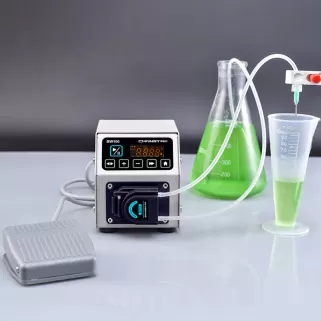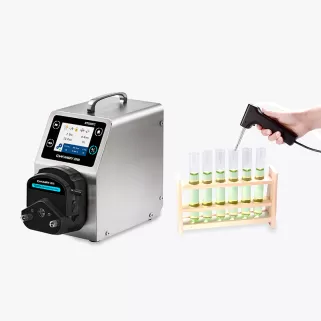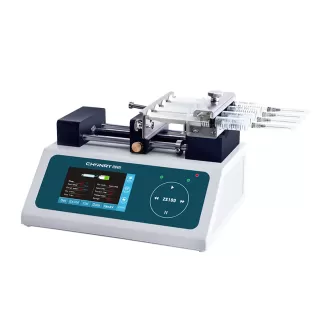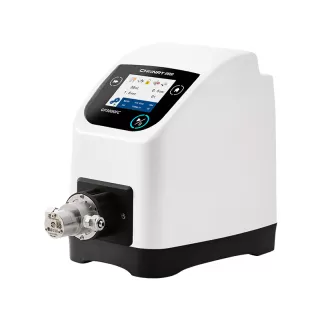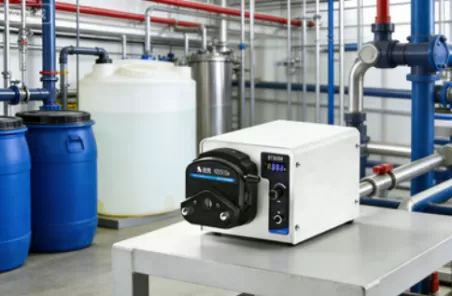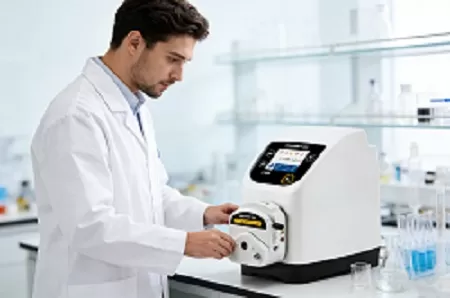In modern laboratories, precise, reliable, and pollution-free control of fluids is the key to many successful experiments. From micro perfusion of cell culture to continuous feeding of chemical reactions, a technology stands out with its unique design concept - laboratory peristaltic pump. It is not only a simple liquid transportation tool, but also an important equipment for achieving automation, improving data reproducibility, and ensuring experimental safety. This article will comprehensively analyze why laboratory peristaltic pumps have become a "powerful assistant" for scientific research and analysis.
1、 What is a laboratory peristaltic pump? Principles and core advantages**
Peristaltic pump, also known as hose pump, works by simulating the digestive peristalsis of the human body. By driving the roller (or pressure block) with a motor to alternately squeeze elastic hoses, a closed cavity is formed at the squeezing point, pushing the fluid forward; Negative pressure is generated behind the squeezing point, sucking in new fluid to achieve continuous delivery.
This "fluid only contacts the hose" design gives the laboratory peristaltic pump unparalleled advantages:
1. Extremely high precision and repeatability:
The conveying volume is only related to the pump head speed and the inner diameter of the hose, providing extremely high measurement accuracy (some models can achieve an accuracy of ± 0.5%), ensuring the reliability and repeatability of experimental results.
2. Excellent fluid isolation (pollution-free):
The fluid is completely sealed inside the hose, with zero contact with the pump body itself. This completely avoids cross contamination and residue, especially suitable for transporting expensive, sensitive, or biologically hazardous samples.
3. Strong medium adaptability:
Can easily handle viscous, solid particle containing, shear sensitive (such as cells, proteins) or corrosive liquids. Simply choose the appropriate material for the hose to handle various challenging fluids.
4. Easy maintenance and low cost:
The only consumable is the hose, which can be replaced in just a few seconds without the need for any tools. This greatly reduces maintenance costs, downtime, and operational difficulty.
2、 Key application scenarios of laboratory peristaltic pumps
The application of laboratory peristaltic pumps is almost ubiquitous in all fields that require liquid handling.
1. Life Sciences and Medical Research**
Cell culture and bioreactor: Provides cells with sustained and stable nutrients, gases (such as oxygen delivered through silicone tubing), or pH regulated culture media, while gentle delivery protects cells from shear damage.
Protein chromatography and purification: precise delivery of samples, buffers, and eluents for protein purification systems such as AKTA, achieving efficient separation and purification.
Animal experiment microinjection: In pharmacological or toxicological studies, continuous, low-speed intravenous or intraperitoneal administration of drugs to experimental animals is performed through a micro peristaltic pump.
In vitro diagnostic equipment: As the core component of fully automated biochemical analyzers, chemiluminescence immunoassay analyzers, and other equipment, it is responsible for the precise distribution of samples, reagents, and cleaning solutions.
2. Chemical synthesis and analytical chemistry
Continuous flow chemical reaction: In flow chemistry, precise control of the feed rates of multiple reactants is achieved to achieve efficient and safe continuous synthesis.
Introduction of Spectral Analysis Samples: Liquid samples are stably transported to atomizers in instruments such as ICP-MS (Inductively Coupled Plasma Mass Spectrometry) and Atomic Absorption Spectroscopy.
Automatic Sampling and Dilution: Used in conjunction with an automatic sampler, it enables automatic collection, dilution, and injection from sample bottles into analytical instruments, improving experimental efficiency.
3. Pharmaceutical and food industries
Process development and scaling up: The transmission and filling of medicinal and fermentation liquids are carried out on a laboratory scale, and the data can be directly used for process scaling up in pilot and production scales.
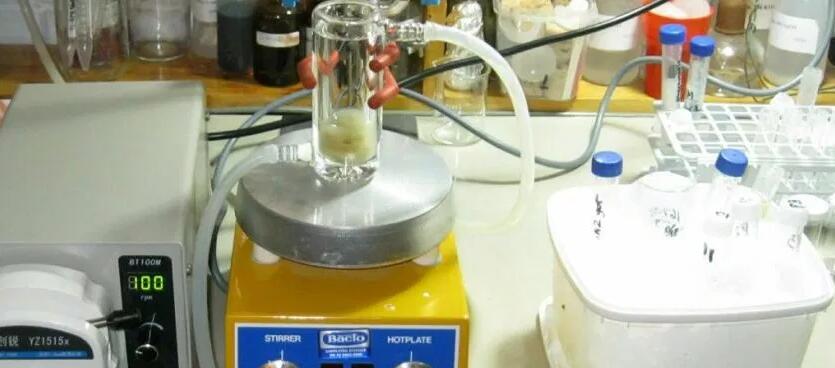
Water quality and environmental monitoring: In online water quality analyzers, it is used to continuously collect water samples and add reagents to monitor indicators such as COD and ammonia nitrogen.
3、 How to choose the appropriate peristaltic pump for your laboratory? **
When facing the dazzling array of products in the market, making the right choice requires considering the following points:
1. Flow range and accuracy: Choose the appropriate flow range and accuracy model based on your experimental needs (whether it is micro infusion at the μ L/min level or high flow transmission at the L/min level).
2. Number of channels: Do multiple liquids need to be transported simultaneously? Choosing a multi-channel pump can save space and cost.
3. Control method and function: Basic speed control, or do you need programmed control of flow curve? Do communication interfaces (such as RS232, USB, Ethernet) need to be used in conjunction with computers or other devices?
4. Hose compatibility: Does the pump head support multiple specifications of hoses? Hose material (such as Pharmed) ®, Silicone, Viton ®) Is it compatible with your fluid?
5. Portability and stability: Is it used for desktop fixed experiments or portable devices that require outdoor sampling?
4、 Practical skills and maintenance of peristaltic pumps
The selection of hoses is crucial: always choose the most suitable hose material based on the fluid's chemical properties, temperature, and pressure. Regularly inspect the hose for signs of wear and replace it promptly.
Avoid 'dry running': Long term operation without fluid can rapidly accelerate hose wear.
Optimize pump head layout: For multi-channel pumps, a reasonable arrangement of hose paths can avoid entanglement and compression.
Regular calibration: To ensure long-term accuracy, it is recommended to regularly calibrate the flow rate of the pump using standard instruments.
Conclusion
The laboratory peristaltic pump has become an indispensable basic equipment in modern laboratories due to its precision, safety, flexibility, and ease of maintenance. It is not only the cornerstone for implementing automated experiments, but also an important tool for ensuring data accuracy and scientific rigor.
Whether you are exploring the mysteries of life or conducting precise chemical synthesis, a high-performance peristaltic pump will be your trusted partner.
Explore our laboratory peristaltic pump series now and find the perfect fluid solution that meets your specific research needs!
Keywords: laboratory peristaltic pump, precision fluid transfer, peristaltic pump head, micro perfusion, cell culture, continuous flow chemistry, bioreactor, automatic sampling, laboratory automation, hose pump, pollution-free delivery, precise measurement.





